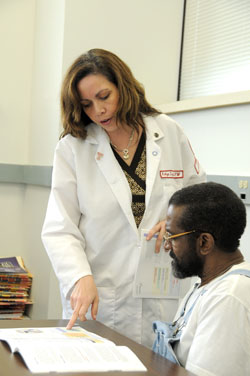Diabetics learn from doctors, each other, at Temple University
| Christopher Bailey used to be a boxer. He was scrappy, he says, but strong, which helped him beat guys twice his size.
“Look at my face — no cuts or scars. My ears and eyes aren’t messed up like some other fighters,” he says. “I was careful. I learned everything I needed to know about each guy I went up against and changed up my fighting to beat him.” But in 1993 Bailey took on his toughest opponent yet — diabetes. If it had been a boxing match, he would have lost, he said, because he didn’t know anything about this opponent and didn’t change his fighting style. “For years, I wasn’t doing anything different,” he says. “I kept eating and drinking what I wanted, not realizing I was hurting myself.” That is, until a bout with uncontrollable blood sugar, dizziness and confusion left him in the hospital for four days. Since then, he’s been trying to learn everything he can about his disease to avoid knocked down again. Bailey began attending Temple University School of Podiatric Medicine’s diabetic support group, started by Kathya Zinszer, D.P.M. and Carol Otte, C.R.N.P., C.D.E., to learn the tools he needed to effectively manage his diabetes. |
 Photo by Kelly & Massa
Kathya Zinszer, D.P.M., discusses blood sugar numbers with Christopher Bailey, a participant at Temple podiatry’s diabetic support group. Zinszer started the group in August with Carol Otte, former certified diabetic educator at Temple, which combines expertise from healthcare professionals with the life experiences of fellow diabetics to help participants better manage their disease.
|
|
The group, which was formed in August, offers expertise from healthcare professionals such as certified diabetic educators, endocrinologists, nutritionists, podiatrists and physical therapists, combined with the life experiences of fellow diabetics, to enable participants to take control of their disease. Alethia James, who was diagnosed three years ago, has been to every session and finds them invaluable. “I wish I had this type of program when I was in school,” she says. “When I was younger, I ate a lot of junk. If I had all this education back then, I might not be in the situation I’m in today.” In a recent session, Zinszer, director of community outreach at Temple’s podiatry school, and participants dispelled some common myths about diabetes. “As physicians and healthcare providers, we’re able to act as a guiding tool and provide a forum where patients can share real life struggles and triumphs of the everyday reality of living with the disease,” said Zinszer. Patients like Brenda Mora, who has had diabetes for more than 25 years, are an invaluable resource for group participants. Because she has had the disease for the longest amount of time of anyone in the session, she answered questions in tandem with Zinszer. “The name of the game is numbers,” Mora says, when participants inquire about the myth that diabetics have to cut every sweet out of their diet. “Watch your numbers. Check your blood sugar levels often. After you eat. Before you exercise. These are things you need to do to stay healthy,” she says. Mora brings it back to basics, stating it always comes down to what you eat. After battling obesity all her life, she lost more than 200 pounds through diet, exercise and determination. Now she attends several diabetic support groups, which she says help her stay motivated and able to manage her diabetes. Zinszer notes that education is an important part of treatment for diabetics, especially in Philadelphia, where the rate of new diabetic cases is 2 percent higher than the national average. “Diabetes has flown under the radar here for so many years,” says Zinszer. “It’s so important to learn how to effectively manage the disease. And what better way to do it than with people who have already been down the same path? Diabetes can definitely take a part of your life if you don’t take care of it.” Temple podiatry’s diabetic support group meets in the Foot and Ankle Institute at the Health Sciences Center on the third Thursday of every month. For more information, call 215-707-2499. |
|